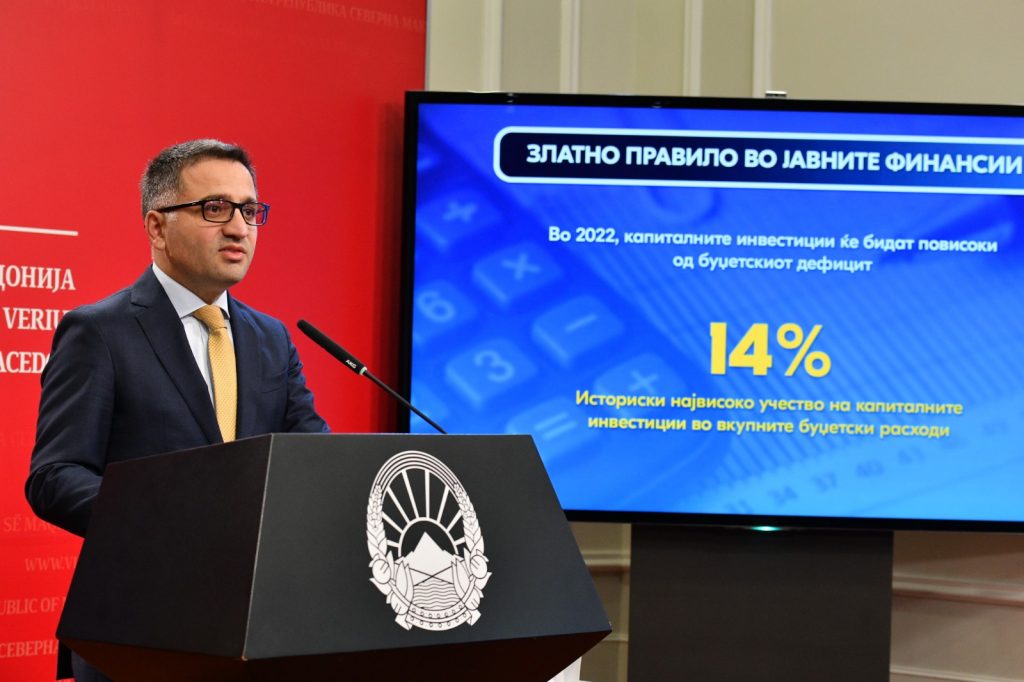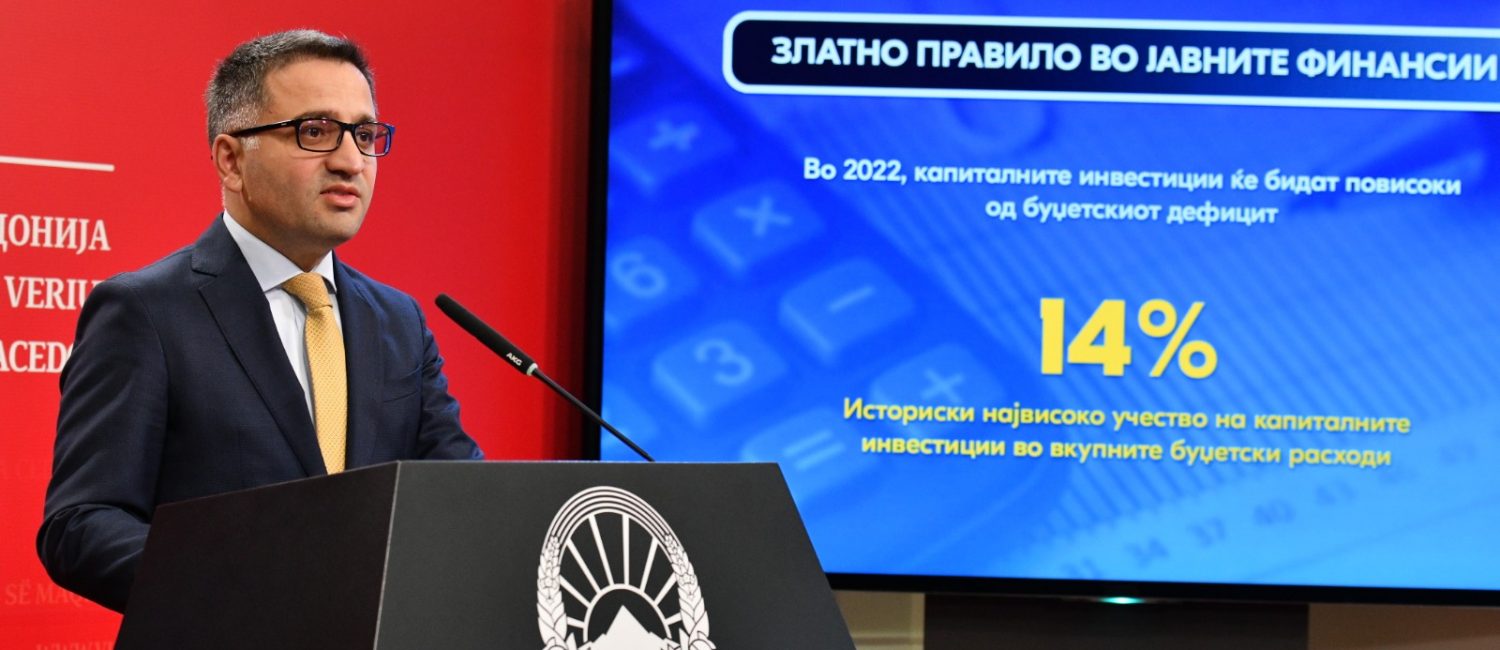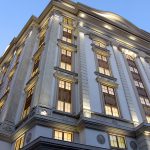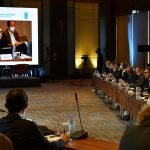2nd November 2021, Skopje – Extending the measures aimed at protecting the health of people, significantly scaled up capital investments, regular and timely payment of wages, pensions and social allowances, coupled with fiscal consolidation, are the main objectives of the 2022 Draft Budget, which the Government adopted at its session held on 30th October, being presented at today’s press conference by Minister of Finance, Fatmir Besimi. The 2022 Budget execution will provide for underpinning the economic growth, projected at 4.6%.

Total revenues under the 2022 Draft Budget are projected in the amount of Denar 238.9 billion, being higher by 7.4% compared to this year’s ones. Total expenditures are projected in the amount of Denar 272.4 billion, being higher by 1.4% compared to 2021. Deficit is projected in the amount of Denar 33.5 billion or 4.3% of GDP, being lower by 2.2 percentage points compared to the 2021 deficit.
Thereby, capital investments are higher than the budget deficit, amounting to Denar 37.8 billion, being higher by around 27% compared to 2021. Thus, the golden rule of public finance is being attained, as Minister stressed.
-The peculiar feature of the 2022 Draft Budget is that the deficit will only be used to support a substantial portion of capital investments,. According to all features, the 2022 Budget will include a development component. Budget’s development component is seen through increased funds for capital expenditures by approximately 27% compared to 2021, meaning Denar 8 billion more have been projected for capital projects in 2022. Next year’s capital expenditures are projected to account for 14% of the total expenditures, being at all-time-record high level, Minister said,
This Budget peculiar feature is that the citizens’ money will be used in areas yielding the best results in achieving the objectives pertaining to higher quality of life.
Funds will be intended for intensification of the implementation of infrastructure projects, i.e. investments in road and railway infrastructure, energy and utilities infrastructure, as well as capital investments aimed at improving the conditions in the health, education and social systems, agriculture, culture, sports, environmental protection and judiciary.
-In order to respond to the still present challenges stemming from COVID-19 pandemic, increased funds are to be allocated for the health sector, being projected in the amount of Denar 7.4 billion. Significant amount is intended for procurement of COVID-19 vaccines; reconstruction of public health institutions in the amount of around Denar 260 million; medical equipment, renovation and equipping of vaccination points, as well as other programs, Besimi said.
Better efficiency and effectiveness in using the public funds will be attained via strengthened monitoring within the CAPEF (capital expenditure efficiency) mechanism, introduction of several indicators for measuring the performance of budget users, as well as Integrated Financial Management Information System and Integrated Tax Information System.
Cutting the operating expenditures to 86% of total expenditures also speaks in favour of the focus being placed on capital investments.
Under the Draft Budget, operating expenditures have been reduced by Denar 4.3 billon compared to 2021 or by 2% lower, i.e. Denar 234.6 billion. Thereby, expenditures related to goods and services projected in the amount of Denar 20.6 billion, have been reduced by around 6% or by Denar 1.3 billion, whereby as a result of the fiscal consolidation, the operating expenditures will be also reduced to minimum.
Minister pointed out that the citizens can feel certain that the 2022 Budget is liquid, whereby wages, pensions and social allowances will be paid on regular basis.
We remain committed to optimizing the administration by controlling new employments, as well as improving the quality of life of employees and increasing the motivation for professional, high-quality and complete fulfillment of the working tasks.
Social transfers are projected in the amount of Denar 124.5 billion, with Denar 64.4 billion being intended for paying pensions, Denar 11 billion aimed at paying social allowances for the vulnerable categories, Denar 1.4 billion aimed at paying unemployment benefit, with Denar 1.8 billion being intended for active employment policies and measures.
The support for the agricultural sector is to be extended by paying subsidies and funds under the IPARD Program, to be followed by extending the support for the private sector, the active employment policies and measures, whereby the municipal funds will be also increased through the fiscal decentralization reform.
What is expected in 2022 is accelerated growth, projected at 4.6% amid increased gross investments by 8.5% in real terms. Final consumption is projected to increase by 3.1%, export by 8.3%, whereby the number of employed people is also expected to increase by 3.1%.
In addition, inflation rate is expected to be stabilized, being projected at 2.4% in 2022, whereby the price pressures stemming from the uncertainty related to the prices of energy and some of the primary products on the global stock markets, are expected to be eased starting the second quarter of the year.
“In 2022, we remain committed to attaining the priorities for accelerated economic growth, with special focus being placed on health sector, fiscal consolidation, ongoing reforms, judiciary and Eurointegration, green agenda, digitalization, innovations and technologic development, human capital development, investments in physical infrastructure, social cohesion, enhanced institutional capacities”, Besimi said.
The Budget is a strategic document, a financial mirror of Government priorities, geared towards implementing the Government Program in favor of the citizens. Adopted strategic documents covering the medium term period 2022-2026, upon which the designing and planning of this Budget is based, provide for underpinning the accomplishment of these goals, that being: the Fiscal Strategy, Public Debt Strategy, Fiscal Sustainability and Economic Growth Plan, Growth Acceleration Plan, Public investment Plan, Economic Reform Program, etc. To the end of inclusive policy making, we also incorporated the recommendations for the policies and the reforms under the international and national conferences, by also taking into account the debates covered at the Skopje Economic Finance Forum (SEFF).
















